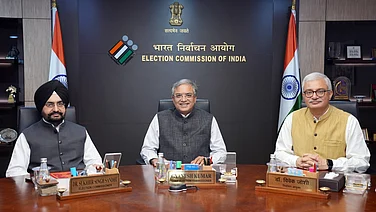Undeterred by any of it, the farmers were determined to march ahead. One of them, Bhausaheb Gagode, from Dindori Taluka, Nashik, said: "We have only 2.5 acres land on which we grow crops like vaal, chawli and nagli. We have been tilling it for over 25-30 years and we applied for the transfer under Forest Rights Act in 2008 but nothing has happened. I have two children, wife, brother and parents to look after. I have completed BA but there are no jobs and our entire family is dependent on this plot, which we can till for only six months of the year. We want new ration cards to be issued, want the payment under Sanjay Gandhi Niradhar Yojana to increase to Rs 2000 from Rs 600 and not give our water to Gujarat."







